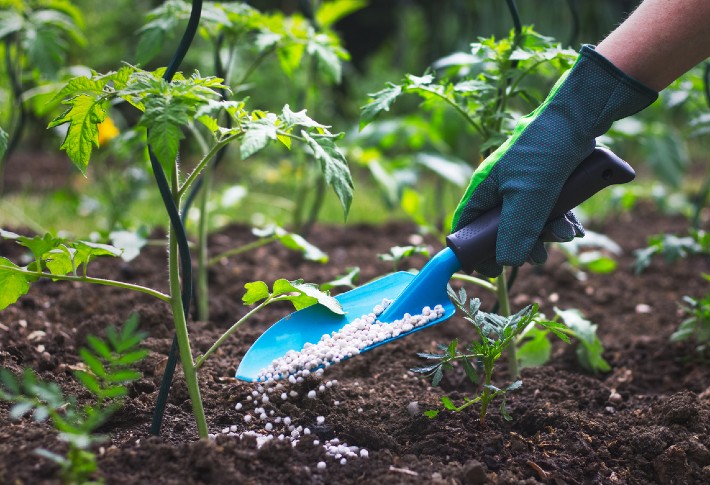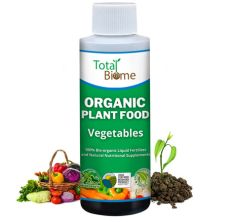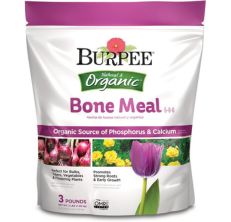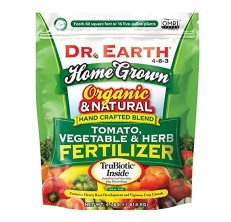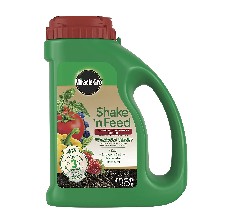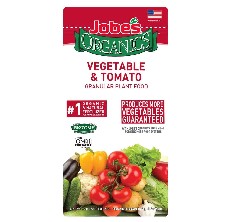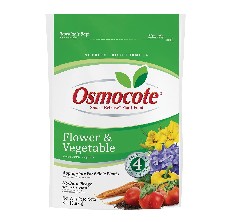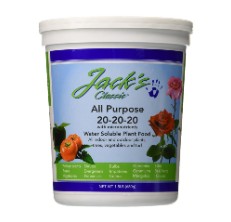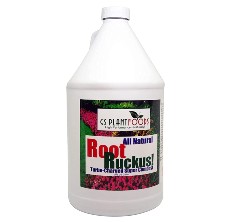- Flowers & PlantsVegetablesOur content is meticulously curated through independent research, testing, reviews, and AI-driven recommendations, all designed to present you with the finest product choices. When you make a purchase through our links, it could result in us earning a commission.
The Best Vegetable Fertilizer of 2024
Last updated: Apr 9, 2024
Plants in a perfect world would get all the nutrients and trace elements they need from your garden’s soil. However, in the real world, your garden, lawn soil, and the plants that grow in it frequently require a little assistance from human hands. Organic fertilizers may help you improve your garden, yard, or landscape by boosting the health of your soil. That’s why we’ve reviewed the best vegetable fertilizers in 2024 for you to explore and improve the quality of your garden. The Total Biome Vegetable Fertilizer is the best vegetable fertilizer for your plants, but we've also included several other great alternatives!
Our Top Picks For Vegetable Fertilizers
- Best Overall: Total Biome Vegetable Fertilizer Shop Now ➔
- Best Value: Burpee Vegetable Fertilizer Shop Now ➔
- Runner Up: Dr. Earth Vegetable Fertilizer Shop Now ➔
- Most Versatile: Miracle-Gro Vegetable Fertilizer Shop Now ➔
- Best Protection: Jobe's Vegetable Fertilizer Shop Now ➔
- Best Growth: Osmocote Vegetable Fertilizer Shop Now ➔
- Best Nutrients: JR Peters Vegetable Fertilizer Shop Now ➔
- Best Formula: GS Plant Foods Vegetable Fertilizer Shop Now ➔
View all ContentsThe Best Vegetable Fertilizers
Best Overall
The Total Biome Vegetable Fertilizer is a quality fertilizer designed to provide everything your vegetable plants need for growth and abundant yields. This specially formulated blend contains essential nutrients like nitrogen, phosphorus, and potassium, allowing for robust root development and lush foliage growth. Additionally, it has beneficial microbes and organic compounds that improve soil structure, support nutrient absorption, and create a favorable environment for plant growth. Whether you’re an experienced gardener or just starting out, Total Biome Vegetable Plant Food is perfect for a variety of uses.
It encourages healthy flowering, fruiting, and productivity, resulting in a bountiful harvest season after season. It also promotes soil health, giving your garden long-term benefits beyond just the current season’s growth. Overall, Total Biome Vegetable Plant Food is an excellent choice for gardeners looking to boost their yield while helping to promote sustainability in their gardens. With its carefully formulated blend of essential nutrients and its USDA certification and testing process, it is sure to provide the best possible results for any vegetable garden, making it the best overall on our list.
Pros
- High-quality design and construction
- Easy to use
- Reliable performance
Cons
- Could be toxic to animals
Best Value
Achieve vibrant and productive vegetable plants with the Burpee Vegetable Fertilizer! This organic-certified fertilizer contains bone meal, a natural source of essential organic nitrogen, phosphorus, and calcium. By adding it to your soil or potting mix during seed starting or prior to harvest, you’ll fuel strong root development, promote vibrant blooms, and enjoy more delicious vegetables. The slow-release nature of this fertilizer ensures a steady supply of nitrogen for robust growth throughout the growing season.
With Burpee’s clear instructions, it’s easy to determine the right amount to use. Not only is the Burpee Vegetable Fertilizer ideal for new bedding plants and established flower gardens, but it also helps naturally deter rabbits from your garden. Its granular consistency makes it effortless to spread, making it ideal for fall bulb planting or when planting flowering bulbs like tulips. Rest assured, this fertilizer is proudly made in the USA and meets the high standards of Burpee’s commitment to quality.
Pros
- Promotes stronger root development
- Enhances plant growth throughout the season
- Ideal for fall bulb planting
Cons
- Little pricey
Runner Up
Dr. Earth is extremely useful to vegetable plants. Aside from the fact that it doesn’t have any chicken manure or GMO components, it is entirely organic. This vegetable fertilizer ensures that your plants receive proper nutrition since the nutrients are available in high concentrations. It results in a plentiful harvest of healthful and flavorful vegetables. Eight specific strains of Endo and Ecto Mycorrhizae add to the product’s value. Together, these boost the plant’s capacity to withstand drought and increase the availability of all nutrients in the plant. You can utilize it during seed germination or seed transplantation.
Pros
- Nutritional availability is improved
- Useful for transplantation
- Improves resistance to dry conditions
Cons
- The correct quantity for container plants is not provided
Most Versatile
Miracle Gro’s feed vegetable fertilizer is one of the few fertilizers that give plants just what they require. Natural components and micronutrients are included in this product’s one-pound and four-pound packages. This fertilizer feeds the bacteria in the soil with natural nutrients to maintain long-term health, ensuring strong roots and water purity. In addition, micronutrients and calcium are readily available to help your plants develop more harvests.
Interestingly, this product’s helpful soil bacteria break down the natural components into nutrients that encourage root growth. Plants’ root strength and water efficiency improve as a result of this. Also included in this plant food is calcium, which helps strengthen the plants’ cell walls and produce superior quality veggies that keep fresh for an extended time.
Pros
- Provides equal nourishment to the plant’s roots and branches
- Strengthens the root system
- Improves water conservation
Cons
- Inconsistent batches of the same product
Best Protection
Take a look at this organic granular vegetable fertilizer from Jobe’s Organics if you like granular fertilizers. All-natural components and biodegradable materials are used in this product, making it environmentally friendly and sustainable. Adding to that, the product aids in boosting the plant’s ability to absorb nutrients and preventing their depletion. A unique collection of microorganisms is used in this fertilizer.
That breaks down the substance so that plants may better utilize it. Consequently, your plants are shielded from pests, drought, and disease, all of which can harm them. Among the crops, you may grow onions, tomatoes, cucumbers, potatoes, and carrots, all of which are edible.
Pros
- Enhances the soil
- Maintains the supply of nutrients
- Defends plants against adverse weather
- Suitable for use around children and pets
Cons
- Initially emits a strong odor
Best Growth
Osmocote smart-release plant food, designed for vegetable plants, is essential for a successful vegetable garden. It will help you grow more tasty veggies throughout the season by promoting aggressive top growth and strong root development. If you’re in the market for a vegetable fertilizer that will feed up to 40 square feet with each pound, go no further than Osmocote’s fertilizer. Both annual and perennial plants and vegetables can benefit from this fertilizer. Pellets of this plant food are covered with a special resin that releases nutrients slowly at first and then more quickly during the peak growing season.
Pros
- Suitable for perennials as well as seasonal crops
- Makes the garden active during the growth season
- Promotes a healthy and abundant harvest
- Simple to use
Cons
- Possibilities of toxicity to people
Best Nutrients
If you’re looking for an all-purpose vegetable fertilizer, this one from Classic Jack’s is a good choice. In addition, it may be utilized in indoor plants. The key reason for the product’s popularity is that it dissolves significantly more quickly than similar products. Furthermore, this fertilizer feeds both the leaves and the roots of the plants. This item comes in a 1.5-pound resealable tub that is simple to handle and store. Not only that but there’s more. A convenient measuring scoop and thorough instructions are also supplied, making the use simple. You may rely on this fertilizer if you’re seeking a high-quality, all-purpose fertilizer.
Pros
- Encourages rapid leaf growth and green-up
- Packaged in a tub that’s easy to handle and store
- Comes with a measuring scoop
Cons
- It can be harmful to humans sometimes
Best Formula
The All Natural Root Ruckus Liquid Compost by GS Plant Foods is an all-purpose fertilizer that promotes soil health. It is formulated with a blend of organic humic acid, liquid kelp, and concentrated turbo-charged compost, making it a great choice for nearly any type of plant or garden you may have. This fertilizer works synergistically with all other fertilizers and can be used on both indoor and outdoor plants, including foliage plants, shrubs, roses, and more.
This product is easy to apply with just the right amount of dilution. By mixing 3 ounces with 1 gallon of water for foliar spray or 4 ounces for direct soil applications, you can effectively give your plants the nutrients they need to flourish. The humic acid in this compost helps improve root development, increases the natural energy processes of the plants, and improves the plant’s immune system.
Pros
- Works with other fertilizers
- Easy to apply
- 100% organic
Cons
- Doesn’t smell great
Buying Guide: Vegetable Fertilizers
As a gardener, you know that the appropriate fertilizer is essential if you want the most substantial yield possible. The problem is that there are so many options that picking the best one is tricky. There is no need to worry about whether you currently have a vegetable garden or are intending to start one since we’ve got all the information to help you choose the finest vegetable fertilizers right here.
What Kind of Nutrients Do Plants Need and How Does a Fertilizer Help?
Plants require a wide range of nutrients, some of which must be consumed in enormous amounts. The major nutrients in fertilizer are those that may not be readily available in the soil in the proper amount:
- Plants are dependent on nitrogen for growth
- Phosphorous is required for root development and the production of fruit, seeds, and flowers
- Potassium is needed for root growth and tolerance to drought and disease
In addition to macronutrients such as oxygen and carbon dioxide, secondary nutrients such as calcium, magnesium, and sulfur can also be found in soil or air. Only a modest amount of micronutrients — such as boron and chlorine — are required for a plant to thrive.
Perform a soil test before going out to buy fertilizer. You will know what to do with the soil for the better health of the plants and vegetables you intend to cultivate.
Are There Different Kinds of Vegetable Fertilizers?
There are different kinds, and since every lawn is unique, you should pick the right fertilizer for yours.
Granular fertilizers
Granular fertilizers are commonly used for lawns and gardens. Using a mechanical spreader or shaker container, apply dry granular fertilizers and then water them in. These fertilizers come in two varieties:
Water-soluble nitrogen (WSN) fertilizers
These quickly add nitrogen to plants. Depending on the weather, they can last anywhere from three to four weeks.
Slow-release fertilizers
It’s possible to get sulfate-coated and polymer-coated versions of slow-release fertilizers, with a shelf life of eight and 12 weeks, respectively. When it rains, the time estimates might change. You don’t have to use these fertilizers as frequently, and you get better results. On the other hand, slow-release fertilizers do not risk burning due to the release of nitrogen.
Liquid fertilizers
They are fast-acting fertilizers. You’ll need to apply liquid fertilizer every two to three weeks since plants absorb it fast through their leaves or roots. You’ll need to dilute the majority of these with water. Many of these products come in hose-end bottles that mix as you apply them, while others require mixing and may be applied with a watering can. You may buy liquid fertilizers for container plants as well as for your lawn.
You may also use fertilizer spikes as a long-term fertilizer by driving them into the soil. They are a convenient way to feed plants and vegetables.
When Should a Vegetable Garden Be Fertilized?
When it comes to fertilizing vegetables, timing is sometimes more important than the type of fertilizer you use. Fertilizer is usually applied to vegetable plants when transplanting or shortly after when the plant is just a few inches tall. Some vegetables may require soil amendments or additional fertilizer treatments later in the season to function at their best, depending on their kind.
What Are a Few Tips for Fertilizing Vegetables?
Soil testing should be done first
Soil testing for home gardeners is usually cheap through the local university extension or community. A soil test should be done at least once every two years to determine the structure and nutritional qualities of the vegetable garden soil. Detailed information on what nutrients are missing from the soil and how to fix them will be provided.
Always follow the label’s arrow
The pace at which fertilizer must be applied varies by brand and type. Pay attention to and follow the directions included in the product’s box. Plant burns can happen if this step is skipped, resulting in stunted development or a dead plant.
Fertilizer should be side-dressed
Keep fertilizer at least 4 to 6 inches away from the roots of your plants. As a result, the plant’s roots are protected from fertilizer.
Do not overfeed
Always apply the recommended amount of the product, or less if necessary.
Avoid feeding before the rain
When it rains a lot, fertilizer might wash away, and water reservoirs can become polluted. Before using fertilizer, wait for a clear day.
The temperature should not be too high for feeding
Do not overfeed plants with fertilizer at a time when they are already battling to survive in the heat. When the daytime temperature drops below 90F, you can resume.
Water plants after using granular fertilizers
When water is used to melt the granular fertilizer, it begins to benefit the plant. In addition to preventing the plant roots from being burned by the fertilizer, watering after adding fertilizer also helps.
Keep fertilizer at a protected location
Fertilizer should be stored in a cool, dry place, away from direct sunshine and moisture.
People Also Asked
Is there a particular type of fertilizer that is best for vegetables?
A balanced fertilizer, such as 10-10-10 or 20-20-20, is needed for most vegetables. They'll also require potassium supplements of them. Nitrogen is essential for leafy green veggies. When compared to organic fertilizer, they are more nutrient-dense.
What is the best approach to feeding a vegetable garden?
You can apply a pound of dry fertilizer for every 100 square feet of garden or every 100 feet of row. Side-dress the rows of plants once they've been planted. To the side and one to two inches below the seed or plant row, fertilization is needed.
When it comes to fertilizing veggies, which ones should you avoid?
When preparing the soil for beets, carrots, and other root crops, avoid using fertilizers manufactured mainly from processed manure. A buildup of manure can cause scabby potato skins and forked roots. Liquid plant fertilizer works nicely with moderate feeders of all kinds.
What kind of fertilizer is best for growing vegetables?
Nitrogen is a crucial ingredient in these fertilizers. It aids in the growth of plants by stimulating the growth of more and more leaves.
Article Contributors
Read More About Garden Gate Review Team HereThe Garden Gate Review Team’s product reviews and in-depth guides are here to help you choose the best products for a beautiful and bountiful garden and backyard. The content is created by The Garden Gate Review Team. Garden Gate’s editorial staff is not involved. Garden Gate is reader-supported: When you buy through links on our site, we may earn an affiliate commission. The Garden Gate Review Team is composed of authors, editors, and gardeners. Artificial Intelligence (large language models) may have been used in the research and creation of the content.
Please reach out to aimperiapt@gmail.com with any questions regarding product testing or specific articles.
